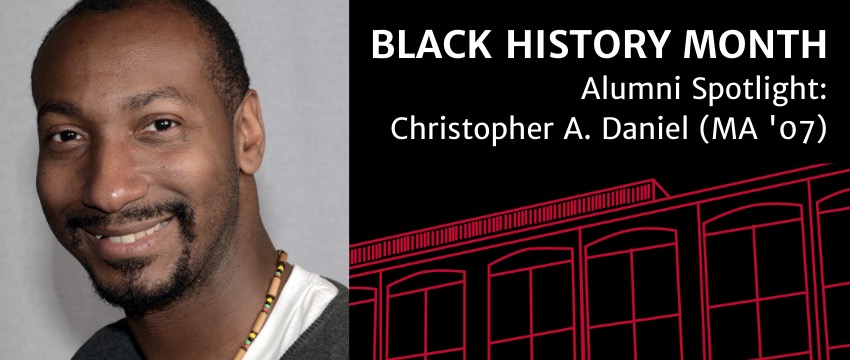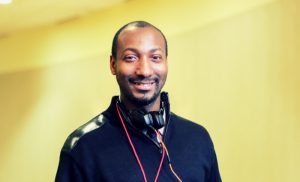Black History Month Alumni Spotlight: Christopher A. Daniel (MA ’07)

Black History Month Alumni Spotlight: Christopher A. Daniel (MA ’07)
Editor’s Note: This is one in a series of spotlights highlighting the work of some of our alumni in celebration of Black History Month. Please watch for more profiles in the weeks to come.
Christopher Daniel works as a journalist and instructor of multimedia and digital journalism in the Department of Mass Media Arts at Clark Atlanta University. He enjoys writing about popular music and culture, civil rights and education. He has freelanced for publications including HuffPost, The Hip Hop Enquirer, Atlanta Magazine and CBS News, and his work has been recognized by the Gay and Lesbian Alliance Against Defamation and NABJ.
What does Black History Month mean to you?
Black History Month gives the country and even the world an opportunity to really celebrate the contributions and the blood and the sweat that Black people have given to this nation, and to the world at large. It’s a moment for us to really look into all the different areas and genres in which Black people have made certain strides, whether it’s in the arts or in the sciences or in education or entertainment. So I think it is an interesting time for us to be able to celebrate our history, but it’s also just a moment for us to dig deep and try to find those narratives that we haven’t heard before and those moments that can enlighten us and shine a really bright light on things that improve our human condition. Black History Month is a combination of us celebrating the contributions to our nation and just our culture, but also really digging deep to find the stories that we haven’t heard.
Explain a challenge that you had to overcome in your professional career.
I think one of the biggest challenges that I’ve overcome specifically as a Black journalist is getting editors to understand certain things culturally that need to be articulated in writing. Especially over the last few years, now we’re getting to a point where things have to be a little bit more transparent and things have to be a little bit more reflective of the communities that we serve. A great deal of what I’ve spent a lot of my career doing is educating people and educating editors on the ways in which Black communities live. Why does a certain song make sense, or if we go to the barber shop, what sort of resonance does the barber shop have on Black men and us being able to relate to one another? I’ve written about our culinary traditions and our literary canons and what they mean to the larger conversations about uplifting humanity or raising awareness.
One of the biggest gifts that I’ve been given — because I don’t really look at it as a challenge, I look at it as a gift — is being able to expose people to the ways in which they need to understand humanity better and to really do their jobs better. When we tell stories about underserved or marginalized groups, I bring in a strong sense of pride and humanity to those narratives and really show people that the way in which they perceive Black people and Brown people is not the way the nation sees it. And it’s been a lot of fun doing those stories and really being the voice for my community.
What classes at Grady College did the most to prepare you for your career?
The first time I had a 9000 level class, there were maybe four people, and I was the only Black student and I was the only master’s student in the class. We took this class in the Peabody office, so you look around and you see all these posters of “MTV Unplugged” and “The Simpsons” and “Roots.” When I was in that class, I did a presentation on “The Boondocks,” which was at the time a big show and it was one of my favorite shows on TV. Everyone in that class was a white Ph.D. student, and even the instructor, Horace Newcomb, had no clue what I was doing. I just remember getting all of these questions from Newcomb and I had no clue why I was getting interrogated like that. But literally, probably a week or two weeks after this presentation, I was on MySpace, and I will never forget this. Aaron McGruder, who created that show and the comic strip, was on his MySpace page and posted a quote that said “Hot damn, I just won a Peabody Award.” That showed me the power of the influence that I had and kind of what my voice was meant to do.

I had what I call the holy trinity in Grady. This was Dwight Brooks, Andy Kavoori and Nate Kohn; those three were my thesis committee members, and Brooks was my thesis chair. And of course, my thesis was on southern hip hop music through the prism of hip hop publications. Doing something at the time that really wasn’t heavy in higher education and now you’re seeing classes on hip hop, on Outkast or on southern hip hop music in general, and using autobiographies as textbooks now. So to be able to come, you know, maybe 13-14 years later and seeing how we’ve really advanced in terms of the sort of material that we’re using in the conversations that we have. That really lets me know that those two years that I spent at Grady College was a monumental time to really move that needle, and doing this 60 years after Charlayne Hunter-Gault integrated Grady and the University of Georgia, really to me, is a big deal, and that’s what makes me proud to talk about this. The one person that helped to integrate and desegregate that program is someone who inspired and motivated me to make the decision that I made to go to Grady.
What does the recent movement to continue the fight for racial justice mean to you personally and professionally?
I feel as though what has to happen going forward so it’s not performative, that it is genuine, is you have to make sure that students are having these conversations in the media courses that they take. And yes, it’s going to be uncomfortable, but imagine how uncomfortable it is being in the newsroom or going in the community and having to write when there is a protest or someone died or something crazy happened that made national news. Literally turning your classes into incubators and making those spaces where you can have conversations about race and have conversations about sexism, so that once there is a moment where they are assigned to do those stories in the future, they know best practices and how to approach those topics so they’re not uncomfortable with it. I think we have to really do a better job at turning our educational spaces into practices, and optimizing opportunities so that when these larger issues come up in the future because those editors and those writers who are having these problems now, they were students too at some point. We just have to do a better job at really having those hard dialogues and creating tough love out of that so that things can be better.
It’s going to take a village for us to really do those sorts of things voluntarily so that we can make the necessary change that has to happen. But if you want to be a journalist especially, it does start with doing the homework. I would like to think that people that want to do those stories and win Pulitzers and win Peabodys and more awards down the line, that they are taking upon themselves the initiative to do the legwork on the ground as students so that they can morph and matriculate into those spaces where they are the productive citizens doing the necessary work. Even when things are quiet, you still have to be very vocal about what needs improvement because things won’t change if you won’t voice it and put it in people’s faces. You’re doing something that helps the larger community change the nature of what’s going on.
How has your field of study changed since you were a Grady student?
When we were in school, Facebook was the new thing. And that’s the platform that everybody was using to promote events on campus. If people had potlucks on the weekend, that’s what they used; somebody had a birthday party, that’s what they used. I honestly don’t think people figured out at the time that you can literally use that to disseminate news. Now when you go online, Twitter is the number one way that a lot of young people get their news. You know people have breaking news on TikTok, they’re breaking news on Clubhouse and panels and things of that nature, so the way that social media and digital media have really become virtual news hubs. Now social media is the wire service.
Another way the industry has changed is we have more spaces where we’re getting opportunities. In those days, internships created pipelines for how students would get their way into ESPN, Bloomberg, and the PR agencies and CNN. A number of opportunities that I’ve received as a journalist have been because someone sees a tweet. It’s totally leveling the playing field so that we don’t have to look to the more arcane old school ways. It’s actually keeping things a little bit cooler and making things a little bit more laid back to where we don’t have to be so formal all the time, which I think is really a good deal. You’re allowing people who really have good voices and have the education to not necessarily be so uptight about getting their voice out to the world. It’s allowing us to be who we are, and I think that’s probably the biggest blessing that’s changed in time since I’ve been in school. We just have to be very diligent about making sure that when we get students in those moments where they can sell themselves on those platforms, they know that the stuff that they’re putting out there needs to have a certain look to it so they can get the moment in the sun that they’re looking for.